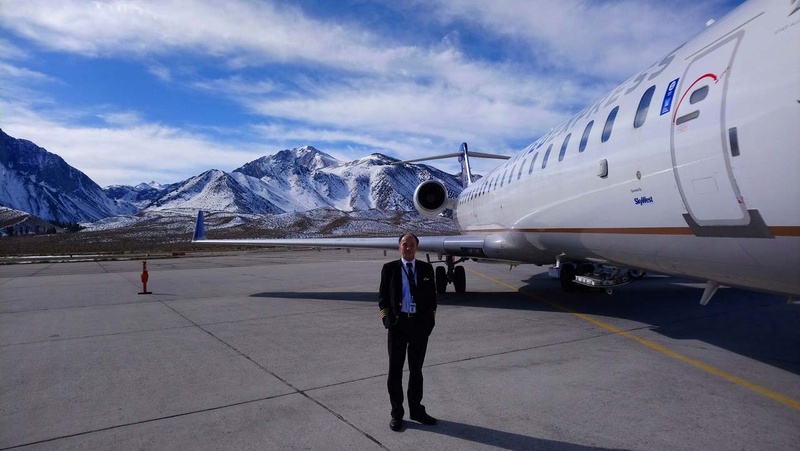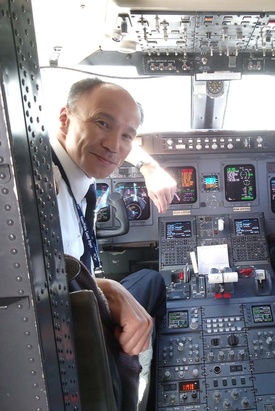Studying abroad by air with my family before turning 30
"If I hadn't made that decision then, I would still be looking up at the planes flying in the Japanese sky and muttering to myself, 'If I'd done it then, I might have been there by now...'" says Naoya Fujita, a captain at SkyWest Airlines, a regional airline in the United States. Seniority is the standard for personnel decisions at American airlines, and Fujita's seniority at the company is 1,451st out of the 5,262 pilots currently in the company. Even in the midst of the current pandemic, "As long as I'm with this company, there's probably almost no chance of me being fired, and I'm still flying a lot of flights. Before the pandemic, my friends told me I should change jobs to another airline. But if I did that, my seniority would go down and I'd have to start again," says Fujita. The reason he is so hung up on job stability is because he has had a winding path since he put his dream of becoming a pilot into action, even before the current global period of uncertainty, including in the aviation industry.
"I had given up on my childhood dream of becoming a pilot because I thought only smart people who become doctors or lawyers could do it, so I graduated from university, worked as an office worker in Nagoya, got married, and had children. However, one day I heard that an acquaintance of mine was going to become an aviation instructor and his fiance was 31 years old. I was 28 years old at the time, so I started to think, 'Maybe it's not too late then.'" After that, I couldn't stop thinking about studying abroad in aviation. I decided on Australia, where I had studied abroad, and persuaded my wife to cross the ocean with my family, carrying our 1-year-old eldest son and our second child in her belly. I studied at a local flight school and secured a job as an instructor there, but in mid-1999, the Australian aviation industry was hit by a recession and the promise was scrapped. So I turned my attention to America, which was in the midst of the "IT bubble," and returned to Japan to obtain a student visa before heading to San Diego with my family. Our children had now grown to two.
After graduating from flight school in San Diego, he worked there for minimum wage. "I got a work visa in May 2001. However, I had no benefits, and with two children, ages 3 and 4, I was struggling to pay rent and food." Meanwhile, Fujita's dream was elsewhere. He was looking for a job as an instructor at an ANA pilot training facility in Bakersfield, a suburb of Los Angeles. However, just as he was close to reaching the required flight hours, the September 11 attacks occurred, and the ANA training facility stopped hiring.
He got a job as a pilot training instructor, but was fired and moved to an airline.
It was two years later, in November 2003, that the facility finally resumed hiring. Fujita passed the recruitment exam, which consisted of a document screening, interview, practical test, and psychological test. "Even though it's ANA, it's an American facility, so most of the people we hire are American," says Fujita, recalling that out of the 60 or so instructors, there were only seven or eight Japanese. In January 2004, he began working as an instructor at ANA's training facility. He also obtained a green card. By that time, his children had reached high school age, and he had bought a house in Bakersfield. Fujita had resolved to "fulfill his dream of becoming an airline pilot, but I'll do my best as an instructor here." However, an unexpected event occurred.
"At the end of 2013, we were told that the facility would close in March of the following year. In other words, everyone would be laid off." Fujita's determination to "continue working as an instructor" was completely shattered. However, he didn't have time to be depressed. "I submitted over 40 applications for changing jobs, but nothing worked. The problem was that I had mostly flown piston-engine aircraft and had no experience with jet planes. I was so cornered that I thought I might have no choice but to make use of my teaching license and return to Japan to become a teacher.
However, at the last minute, I was hired by a regional airline, even though my income was reduced to less than one-third. I joined the company with my wife's understanding that I would work hard for a year and then move on to the next step. In fact, I am still working for that company today." By continuing to work for the same company, my seniority increased, and I was promoted to captain after just two and a half years at the company. My salary also increased to the level I had at the training facility. One reason he chose SkyWest Airlines is that it is the largest regional airline in the United States, but the main reason is that it is a stable company that has never furloughed or laid off a pilot under any circumstances in its 48-year history.
"Both of my sons graduated from college. If they couldn't find new jobs in the US, I was thinking about returning to Japan, but even if they returned to Japan, they didn't go to Japanese language school, so I thought I would have to transfer them to an international school, but I didn't have the money to pay for that, so I was thinking about what to do." He also said that he didn't send his children to Japanese school because he deliberately avoided the Japanese community. "In San Diego, I thought that not only my children but also my wife might need to interact with other Japanese people, so I started sending my children to a Japanese supplementary school every Saturday morning. However, what I felt there was a Japanese value system that said we had to be the same as everyone else, even after leaving Japan. We were living such different lives that we honestly couldn't fit in, and it was overwhelming, so we soon quit Japanese language school."
Seeing Japan from a global perspective
Fujita is now 51 years old. 22 years have passed since he left Japan. Will he continue to fly in the American skies? "A few years ago, my wife started saying that she would like to live in Japan in her old age. I've made her go through a lot of hardships because of my dream, so now I want to go back to Japan and let her do what she loves. I would also like to be involved in some kind of aviation-related work in Japan. It would be great to have a flying job, but I think it would be difficult in Japan due to my age and qualifications, so for example, my wife and I have been talking about the idea of opening a bar where fellow aviation enthusiasts can gather, and we thought that Chofu, which has an airport, or Yao in Osaka would be good places to do that."
However, he says that he has not yet made a final decision to return to Japan. "I love my current job. I wake up at 2am and leave the house at 3am when it's pitch black, in order to make it in time for my shift that starts at 6am, from my home 120 miles away from Los Angeles Airport. But I've never felt bad about it. Just thinking about being able to fly in the sky again today and see those amazing views gets me excited."
Finally, I asked, "What nationality are you, Fujita?" "I came to America for the opportunity to fly, not because I wanted to become an American. But living in America and looking at Japan from the outside has given me a better understanding of the country. If I had to say, I guess I'm a Japanese person who can see Japan from a global perspective." Fujita answered carefully, choosing his words carefully.
© 2021 Keiko Fukuda







